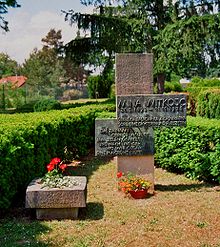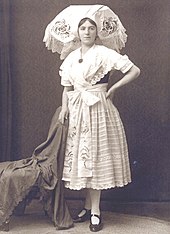Mina Witkojc
Mina Witkojc (German Wilhelmine Wittka ; born May 28, 1893 in Burg (Spreewald) , † November 11, 1975 in Papitz near Cottbus ) was an important Lower Sorbian poet and publicist .
Life
Youth and stay in Berlin
Mina Witkojc was born as the daughter of the Wendish maid Marjana Witkojc (Marianne Wittka) and the innkeeper Fritz Polenz in Burg im Spreewald. The mother left her two daughters after two years because the father married another woman and went to Berlin to work as a tiller. The girl and her sister grew up with her grandmother and on the family inn on her father's side. She attended elementary school in Burg.
In 1907 Mina Witkojc went to Berlin, where she got by as a nanny, flower maker and other activities. In that year she wrote her first poems in German . Since 1914 she was also active in arms production.
In 1917 Mina Witkojc returned to Burg and worked there as a day laborer in agriculture.
Return to Wendish culture
In August 1921 she happened to meet a group of Czech and Upper Sorbian intellectuals with Arnošt Muka who were traveling in the Spreewald. This encounter led to her becoming aware of her Wendish / Lower Sorbian origins again. Until then, she wrote and spoke mainly in German.
She went to Bautzen , where she had been working on the Lower Sorbian newspaper Serbski Casnik since 1923 . Their circulation increased from 200 to 1200 copies during their time. During these years she had many contacts with Upper Sorbian intellectuals, such as Arnošt Muka and Jan Cyž , from whom she received many suggestions. Mina Witkojc translated texts by authors of other Slavic languages into Lower Sorbian, for example the writers Božena Němcová and Petr Bezruč from Czech, Alexander Puschkin from Russian and Handrij Zejler and Jakub Bart-Ćišinski from Upper Sorbian.
In 1926 Mina Witkojc took part in the European Nationalities Congress in Geneva as a delegate. In 1930 she went to the All-Slav Sokol meeting in Yugoslavia .
In 1931 Mina Witkojc was forced out of the leadership of the Serbski Casnik because of her democratic attitudes, in 1933 she was banned from writing by the new National Socialist government.
In 1936 she moved to her old home in Burg. There she earned her living again as a day laborer in agriculture. In 1937 the use of Wendish languages was banned in Germany. As she continued to confess her homeland very confidently and fearlessly in her texts and poems and also maintained contact with intellectuals of other Slavic nationalities, Mina Witkojc was initially banned from staying in the Dresden district in 1941, and then in the Frankfurt / Oder district in 1942 . This forced her to leave Lusatia.
exile
She moved to Erfurt , where she worked, among other things, as an employee in a gardening company. During this time she maintained close contacts with the Lower Sorbian pastor Bogumił Šwjela, who had also been expelled from his homeland, and the Wendish painter Fryco Latk . In her extensive poem "Erfurtske spomnjeśa" ("Erfurt memories") she describes her experiences during this time
In 1946 she went back to Bautzen, where she helped rebuild the Sorbs Domowina . In Lower Lusatia, any Sorbian activities were suppressed by the Cottbus SED district leadership during this time . Witkojc was briefly arrested while pasting Sorbian-language posters for the municipal elections on account of alleged pro-Czechoslovak agitation.
So in 1947 she went first to the area around Varnsdorf (in the Wendish diaspora ), then to Prague .
Last years in Burg

In 1954 Mina Witkojc returned from Prague and settled in her home town of Burg. She appeared as a co-author of an anthology and with individual poems and articles in the Lower Sorbian newspaper Nowy Casnik . In 1955 a volume of poetry "K swětłu a słyńcu" ("To the light, to the sun") was published, which partly consists of reworked poems from the 20s and 30s, in which she dispenses with the Slavic concept of unity. For example, the title of her first poem from 1921 was “Remembering the first meeting with Czech and Upper Sorbian brothers”, but the version from 1955 only mentions “Upper Sorbian brothers”.
She spent her final months in the von Papitz retirement home, where she died in 1975.
meaning
Mina Witkojc is one of the most important poets in Lower Sorbian. She took on a pioneering role in Lower Sorbian poetry like decades before her Jakub Bart-Ćišinski for the Upper Sorbian language . Her poems express a close bond with her Sorbian people and their homeland, the Spreewald .
As a publicist and editor for the Lower Sorbian newspaper “ Serbski Casnik ” and for the Sorbian book calendar “Pratyja”, Mina Witkojc promoted the cultural self-confidence of the Wends / Lower Sorbs in the Prussian Lower Lusatia, where the strong Germanization policy had led to the almost complete loss of national identity for centuries .
Characteristic of her poetry is the frequent allegorical use of images of nature (sun, moon, sea) in relation to the state of the Sorbian people. For example, the position of the Sorbs is compared with an island in a stormy sea (as with Jakub Bart-Ćišinski).
Honors
- In 1964 she received the Ćišinski Prize .
- In Burg the primary and secondary schools "Mina Witkojc" and the "Mina Witkojc Library" are named after her.
- There is Mina-Witkojc-Strasse in Cottbus .
- The state of Brandenburg honors Sorbian / Wendish linguistic commitment with the Mina Witkojc Prize every two years.
Works
- Dolnoserbske basni ( Lower Sorbian poems ), Bautzen 1925
- Wěnašk błośańskich kwětkow ( A bouquet of Spree forest flowers ), Bautzen 1934
- K swětłu a słyńcu ( To the light, to the sun ), Berlin 1955
- Prědne kłoski ( First ears of corn ), Berlin 1958, co-author
- Po drogach casnikarki ( traveling as an editor ) prose collection, Bautzen 1964, ISBN 3-7420-0281-3 . Edited by Kito Lorenc
- Foreword to Jadna z nich jo šołtowka: antologija noweje dolnoserbskeje literatury ( One of you is the mayor: an anthology of recent Lower Sorbian literature ), Budyšyn 1971
- Wilhelmine Wittka: Girl's Song. Youth poems by the later Lower Sorbian poet Mina Witkojz in German. Based on a manuscript from her estate in the Sorbian Culture Archive in Bautzen. Edited by Klaus-Peter Jannasch. 2nd edition, 2015. ISBN 978-3-946190-02-8
literature
- Mina Witkojc . Ludowe Nakład. Domowina, Budyšin 1973.
- Christiane Piniek: Mina Witkojc, Echo from the Spreewald . Domowina-Verlag , Bautzen 2001. ISBN 3-7420-1857-4
- Sorbs. Serbja . A little lexicon. Domowina-Verlag, Bautzen 1989. ISBN 3-7420-0405-0
Web links
- Literature by and about Mina Witkojc in the catalog of the German National Library
- Short biography and information on the work of Mina Witkojc at Literaturport (with picture)
- Mina Witkojc in the Sorbian Cultural Archives
- Photography by Mina Witkojc
Individual evidence
- ↑ Pohlenzschänke Leipe
- ↑ Author Starosta receives Mina Witkojc Prize , deutschlandfunkkultur.de, published and accessed on May 28, 2020
| personal data | |
|---|---|
| SURNAME | Witkojc, Mina |
| ALTERNATIVE NAMES | Wittka, Wilhelmine |
| BRIEF DESCRIPTION | Lower Sorbian poet and publicist |
| DATE OF BIRTH | May 28, 1893 |
| PLACE OF BIRTH | Castle / Spreewald |
| DATE OF DEATH | November 11, 1975 |
| Place of death | Papitz , Lower Lusatia |

